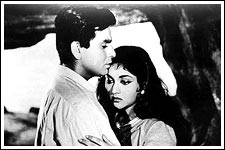
HOME | MOVIES | FEEDBACK |

Dinesh Raheja
I like some films because they appeal to the intellect; some because they beguile the senses. The mystical Madhumati belongs to the latter category.
This Bimal Roy classic of song, dance and images is thick with atmosphere and evokes a mood that sweeps me along without my finding it essential to process it all in the brain first.
Madhumati is tinged with whimsy. In its primeval tale of reincarnation, there is retribution and eternal love. Roy, a poet of light and shadow, draws you in with sheer lyricism. Cinema here is more than just the telling of a story.
This ghost story employs genre staples like stormy nights. The film begins with Devendra (Dilip Kumar) stopping at a haveli [mansion] on a windswept night because a landslide has stopped him in his bid to fetch his wife from the railway station.
Devendra finds the huge mansion eerily familiar, there is a dimly-remembered painting, too. Soon, we are in the midst of a flashback about Devendra's earlier life as Anand, the manager of the surrounding estate.
Anand is an artist and, on an excursion to the surrounding hills and valleys, encounters a tribal girl Madhumati (Vyjayanthimala) dancing and skipping in the lush, beautiful countryside. Anand falls for Madhumati's elemental appeal.
Roy tantalisisngly captures the titular character's will o' the wisp quality. In the famous Aaja re pardesi number, an intrigued Anand gets only glimpses of the blithe spirit singing. The entire song shows Madhumati in long shots with a close-up only at the end.
Or see Madhumati's dance number Zulmi sang aankh ladi. Towards the end of the song, she is singing in the background while chorus girls momemtarily eclipse her. After the first girl passes by, Madhumati is shown still singing behind; but when the second girl passes, Madhumati has disappeared.
Anand and Madhumati's love story is shadowed by Madhumati's premonition of doom when the omens spell catastrophe at a tribal ceremony. Anand's boss and the owner of the timber estate Ugranarayan (Pran) hatches a plot to rape Madhumati. To escape from Ugranarayan's clutches, Madhumati plunges to her death from the roof of his haveli.
The beautiful Madhumati is shown as a seemingly ineluctable part of the nature around her. When the rich, rapacious villain seeks to violate Madhumati, it is perhaps an extension of his exploitation of the natural habitat around him and his disruption of the life of the tribals.
Later, a distraught Anand is amazed when he comes across Madhavi, the mirror image of Madhumati. Anand convinces the lookalike, Madhavi to pose as Madhumati and trap Ugranarayan into confessing his crime.
When Madhavi fails to keep the appointment, Madhumati comes back from the dead, instead! In a scene that would make the Sphinx blink with emotion, Madhumati, now a polymorphous presence, finally extracts revenge on her tormentor. Anand, too, chooses to fall from the same place where the hapless Madhumati had killed herself. The lovers are finally united in death.
...And seemingly in life too.
True love has the power to obliterate spatial and temporal boundaries. After the flashback, Devendra is reunited at the railway station with his wife Radha --- Madhumati reincarnated.
Madhumati is the grandmother of such famous reincarnation films as Milan, Mehbooba, Karz, Karan Arjun, Kudrat and Janam Janam.
Roy proves adept at the chill skill, creating some unforgettable cinematic images like Madhumati running fleet-footed through the woods.
Cinematographer Dilip Gupta also creates and lingers on small but evocative images like the dappled, arcane patterns formed on the ground by the sunlight filtering through the trees. Capturing something as tenuous as a mood is tricky business but the black-and-white photography helps. Bright, brazen colours would have washed the film off some of its mystique.
The music and the tonal correctness of the performances hold us in thrall. Because of the reincarnation angle, Dilip Kumar played two roles as Devendra and Anand, while Vyjayanthimala gets to enact three roles as Madhumati, Madhavi and Radha.
Dilip Kumar's convincing turn at befuddlement, earnestness and fascination anchors our belief in the film's events.
Vyjayanthimala did not have a lot to do in terms of conventional high drama but she had to evoke the mood of the film as Madhumati, the mysterious maid of the mist. She does that well with that enigmatic quality, that incandescent glow, those dances (especially Daiyya re daiyya), and the grace with which she moved.
Sidelights:
* After socially-relevant films like Do Bigha Zameen * Roy reshot the theme song Aaja re pardesi because he was not happy with the results. * Top drawer talents were involved: Hrishikesh Mukherjee's editing, Rajinder Singh Bedi's dialogues and noted Bengali director Ritwick Ghatak's story. * Dilip Kumar had two releases in 1958 --- Madhumati and Yahudi. Both were directed by Bimal Roy. * In 1958, Vyjayanthimala was nominated twice for the Filmfare Awards for two hits released within a month of each other --- Madhumati and Sadhna. She won for Sadhna.
The Music:
* Madhumati is Salil Chowdhary's tour de force. The songs are perennial hits. Suhana safar aur yeh mausam haseen is still played at dandiya functions. * Even Johnny Walker's song Jungle mein mor nacha was popular while Mubarak Begum's Hum haal-e-dil sunayenge is a burnished gem. Of course, the crown belongs to Lata's crystalline rendition of Aaja re pardesi. More than a decade later, Hrishikesh Mukherjee made Jaya Bhaduri, sing this song in the climax of Guddi.
* Word wizard Shailendra, as usual, captured the heart of the film with some simple, heartfelt lyrics in the theme song:
You might also want to read:
|
||
© 1996 - 2002 rediff.com India Limited. All Rights Reserved. |
|||